Over 1000 successful dog ACL surgeries performed
Helping Dogs Heal: Expert ACL Surgery
Helping dogs run, jump, and enjoy life again after ACL knee injury.
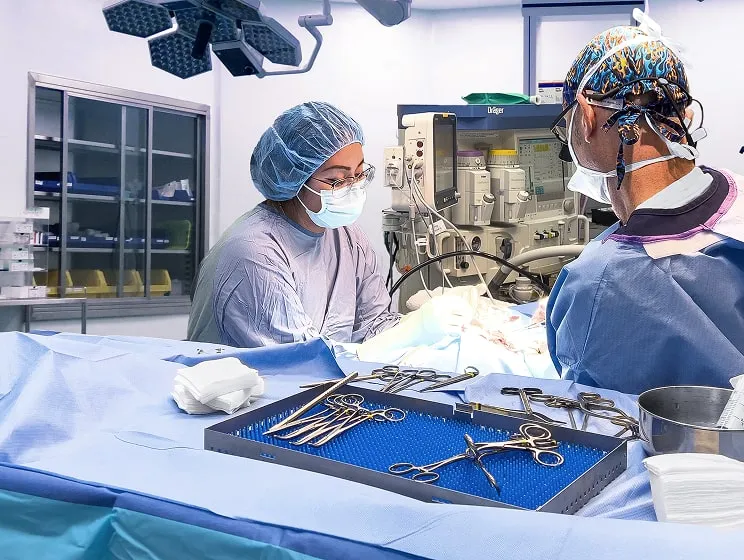
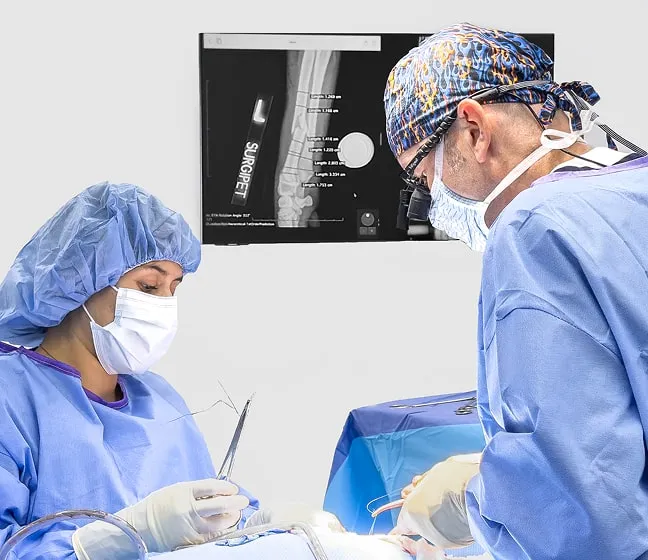
Understanding Dog ACL Injuries
The ACL (cranialcruciate ligament) is one of the main stabilizers of your dog’s knee. When it tears, the knee becomes unstable and painful, often leading to arthritis if left untreated.
Several surgical techniques are available to repair ACL injuries, including Lateral Suture Stabilization (LSS), Tibial Tuberosity Advancement (TTA), and Tibial Plateau Leveling Osteotomy (TPLO).
Surgery stabilizes the joint, relieves pain, and restores your dog’s ability to walk, run, and play.
 Restores knee stability and prevents further injury.
Restores knee stability and prevents further injury. Relieves pain and improves mobility
Relieves pain and improves mobility Proven success for active and senior dogs alike.
Proven success for active and senior dogs alike.
Dog ACL Surgery Serving San Diego, Orange County, Los Angeles, and Riverside
Dog ACL Surgery Experts
When your dog needs ACL surgery, experience matters. Our expert surgery team have successfully repaired thousands of ACL injuries in dogs of all sizes and breeds.
We guide you through the process and stay by your side every step of the way - from consultation to recovery.
The all-inclusive package fee for Dog ACL surgery at SurgiPet covers everything from the initial consultation to post-surgical rechecks and x-rays and offers 30-40% savings compared to large veterinary hospitals' charges.

Your Pet’s ACL Surgery Journey
Initial Consultation
We don’t rush - each consultation includes a full history, a careful hands-on exam of your dog, and time to talk through your goals, concerns, and what matters most to you.
Surgery Day
Experience counts! Our surgeon has performed thousands of orthopedic surgeries over the course of his professional career. With that experience, your dog is in the best hands.
Going Home
Your pet will go home comfortable, fully recovered from anesthesia, and able to walk. You will receive printed instructions, and dedicated post-operative support is available 7 days a week-including weekends.
Providing peace of mind and comfort
What to Expect After ACL Surgery
Most dogs are able to walk with sling support the same day after surgery. Recovery typically takes 8–12 weeks, with steady improvement in strength, comfort, and mobility.
Our team provides detailed home care instructions and support 7 days a week to guide you through every step of healing.
Tips for Recovery:
✔ Follow all activity and exercise restrictions closely.
✔ Return for scheduled rechecks - they’re covered in the surgery fee.
✔ Contact us with any concerns - the surgeon is just a phone call away.

The Safest pet anesthesia. For Every Pet. In Every way.
Ensure your pet’s safety with expert anesthesia care tailored to their specific needs, managed by a board-certified veterinary anesthesiologist.
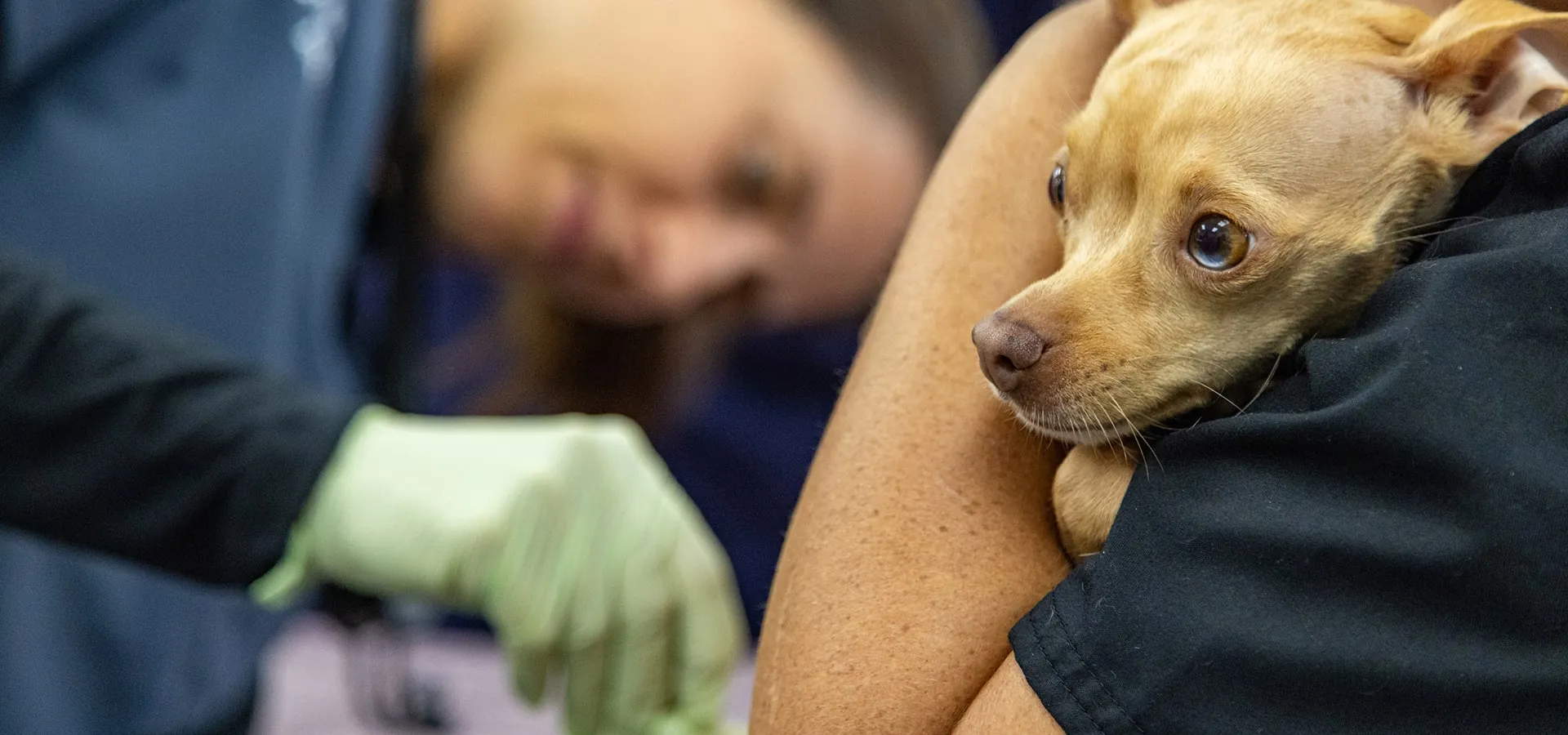
Meet the Dedicated Team Behind Our Success

Dr. Wypart, our founder and lead surgeon, has over 20 years of experience, including thousands of successful TPLO procedures. He is known not only for his surgical excellence but also for the genuine empathy and honesty that comfort every pet parent who walks through our doors.
Dr. Wypart is a highly skilled veterinarian with over two decades of experience in orthopedic and soft tissue surgery. He earned his veterinary degree from the Warsaw University of Life Sciences and completed advanced specialty training in veterinary surgery at the European University of Environmental and Life Sciences. His clinical skills have been shaped by extensive international practice across Europe and North America.
Since relocating to San Diego in 2012, Dr. Wypart has become known for his surgical expertise, particularly in orthopedic procedures involving joint trauma, complex fractures, and advanced soft tissue techniques. A member of the Veterinary Orthopedic Society, he has performed over 1,000 successful TPLO surgeries and remains actively engaged in continuing education focused on fracture management, joint disease, and advanced soft tissue procedures.
Dr. Wypart founded SurgiPet to bring specialized surgical care to pets in San Diego and the surrounding area. His practice focuses on advanced procedures including TPLO for cranial cruciate ligament repair, arthroscopy, and minimally invasive fracture repair.
Outside of surgery, Dr. Wypart enjoys growing vegetables in his backyard, perfecting new soup recipes, and hiking Potato Chip Mountain.
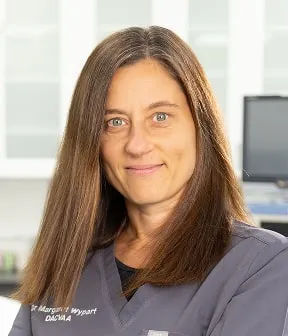
Dr. Margaret Wypart, our co-founder and medical director, is one of a few veterinary anesthesia specialists in California. She personally evaluates your pet’s health, designs a customized anesthesia plan, and ensures they wake up comfortably - just like an anesthesiologist does for people in a hospital.
Dr. Margaret Wypart, DACVAA, is the Medical Director and co-founder of SurgiPet. After veterinary school, she spent three additional years at the University of Pennsylvania's highly respected residency program, focusing exclusively on mastering anesthesia and pain management. This specialized training means she's an expert at keeping pets safe and pain-free during surgery—customizing anesthesia for each individual patient based on their age, health status, and the specific procedure they're having. Whether it's a healthy young dog or a senior pet with underlying health concerns, Dr. Margaret Wypart has the expertise to provide the safest anesthesia possible.
One of only a few board-certified veterinary anesthesiologists practicing in San Diego County, she specializes in ultrasound-guided nerve blocks to minimize discomfort and reduce reliance on systemic medications—allowing pets to wake up more smoothly and return home the same day. Her approach follows the principles of Enhanced Recovery After Surgery (ERAS), emphasizing proactive pain control, early mobility, and rapid return to function.
Outside of work, Dr. Wypart enjoys hiking, skiing, and photography.
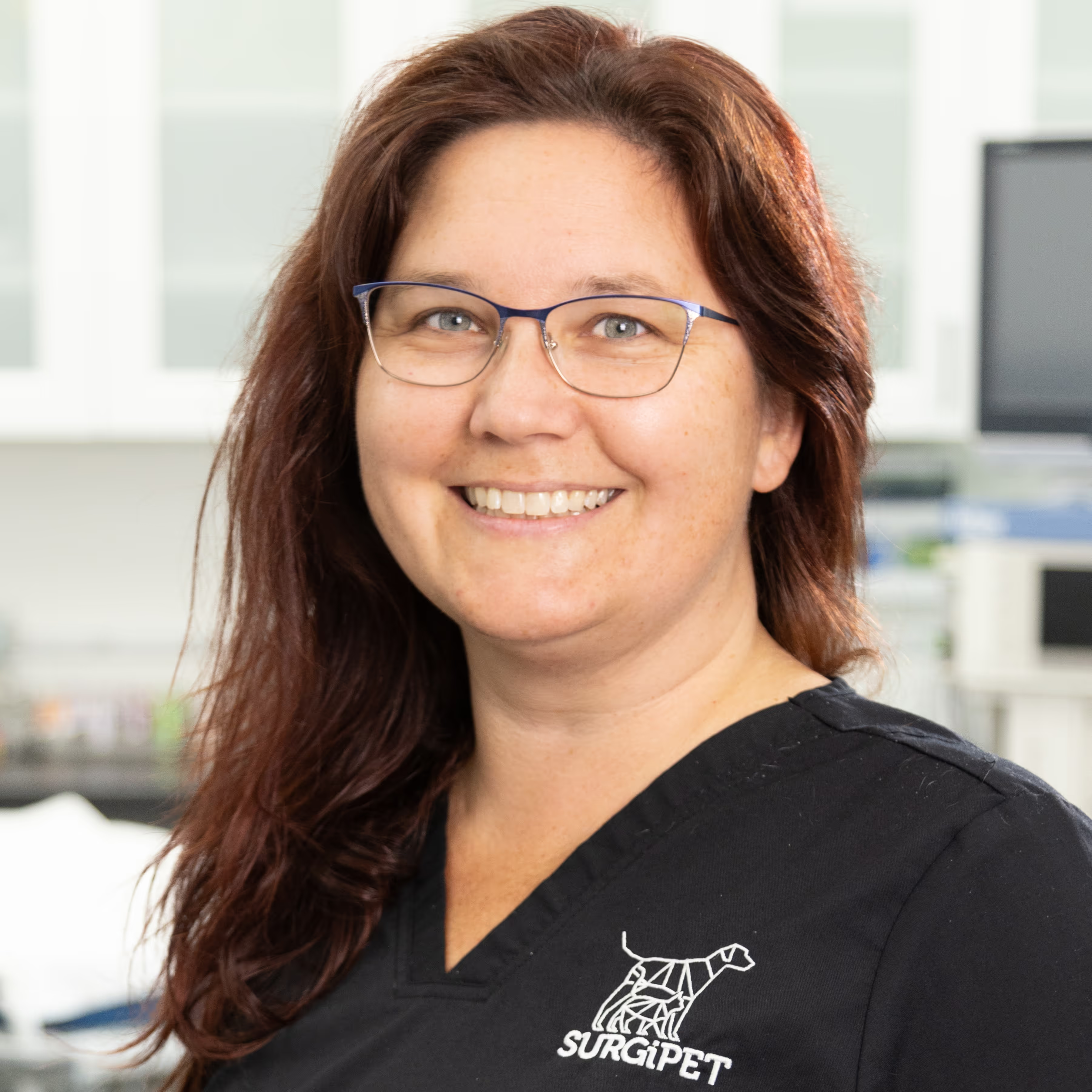
Amber has over two decades of experience as a Registered Veterinary Technician. One of her greatest joys is mentoring and training newer staff, sharing the passion for veterinary care that has driven her throughout her career.
Amber is a Registered Veterinary Technician and our Nursing Director, bringing more than 20 years of experience in veterinary medicine to our team. Most of Amber’s career has been spent in emergency and intensive care, where she developed strong skills in critical patient management, anesthesia, and team leadership. For the past two years, she has brought that expertise to our surgical center, where she focuses on ensuring a smooth experience for patients from admission through recovery and supporting our team in providing exceptional surgical nursing care.
Amber is passionate about creating a positive, collaborative environment for both her team and our clients. She believes that every patient deserves individualized, compassionate care and takes pride in building trust with the families who bring their pets to us. She also enjoys mentoring veterinary professionals and helping others grow within the field.
Outside of work, Amber loves spending time with her family and many pets, traveling in their RV, and curling up with a good book.
Avoid the Guessing Game!
Let SurgiPet Doctors Tell You if Surgery is Necessary

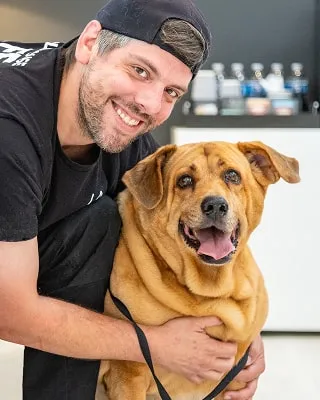
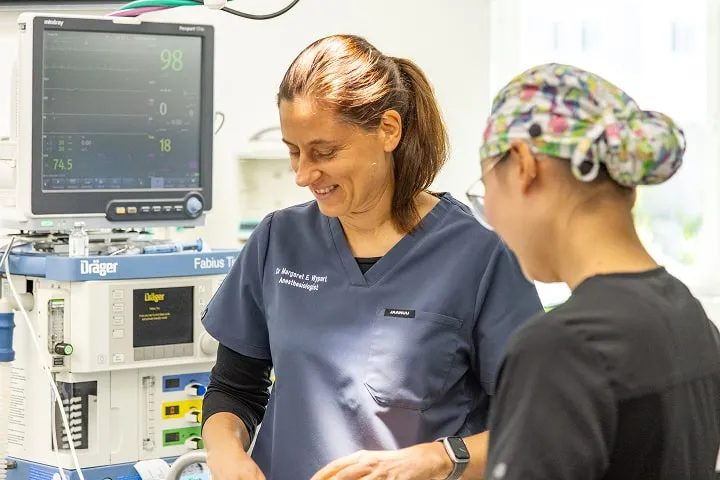

Ready to Give Your Pet the Best Care?
Schedule a consultation today and see why thousands of pet owners choose us.
Book in Just Minutes
Simple and hassle-free scheduling for your convenience.
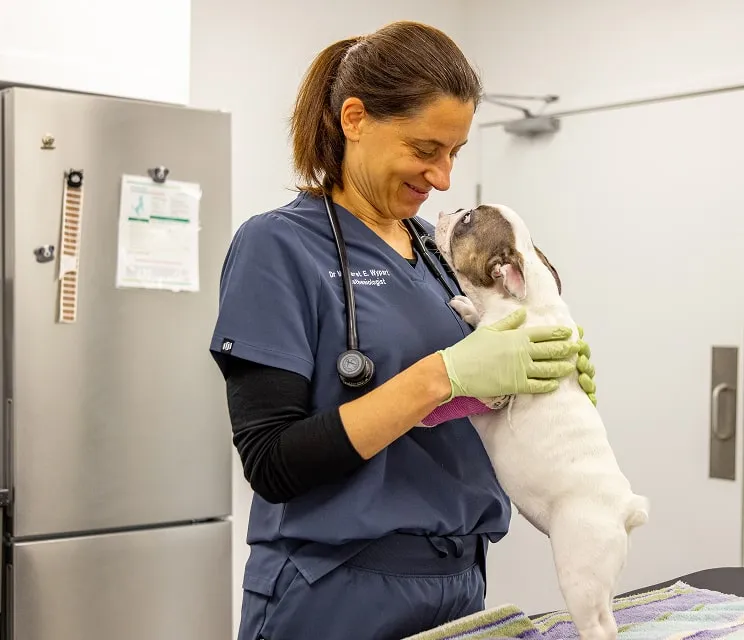
Have Questions? We’re Here to Help!

A torn anterior cruciate ligament (ACL or CCL) is a common injury in dogs’ knee joint. Although rare, it may also happen in cats. The ACL is a crucial ligament that connects the thigh bone (femur) to the shin bone (tibia) and helps to stabilize the knee joint. When the ACL is torn, it causes instability in the knee joint, marked pain, swelling, and lameness.
Dogs typically tear their ACL due to sudden movements - like twisting, jumping, or landing awkwardly. In other cases, chronic factors such as obesity or osteoarthritis weaken the ligament, making it prone to tearing even during routine activity.
The following signs can be intermittent or persistent, depending on the level of injury and your dog’s pain threshold. They may worsen after even short exercise and get better with rest:
- Unwillingness to play, run, fetch, and/or reduced activity
- Not putting weight on the back leg
- Limping or lameness (favoring the injured leg)
- Trouble getting up, difficulty jumping
- Pain and stiffness in the back leg
- Popping noise or swelling of the knee
In dogs, ACL and CCL refer to the same ligament. “ACL” stands for anterior cruciate ligament, which is the common term in human medicine. In veterinary medicine, we usually call it the cranial cruciate ligament (CCL). Both names describe the same ligament inside the knee that stabilizes the joint and helps prevent abnormal movement.
The most effective treatment is surgery. Three surgical options are available for dogs with torn ACL:
- Lateral Suture Stabilization (LSS)
- Tibial Tuberosity Advancement (TTA)
- Tibial Plateau Leveling Osteotomy (TPLO)
TPLO surgery is the preferred treatment for most dogs with torn ACL ligament. Active, working and competing dogs benefit the most from TPLO surgery, as it allows them to return to their respective duties and sports.
TPLO surgery is a procedure performed to stabilize the knee joint in dogs. It is a preferred treatment for dogs who have torn or injured the anterior cruciate ligament (ACL), also called the CCL ligament of the knee.
The surgery involves making a small incision in the knee, reorienting part of the bone, and then attaching a metal plate (implant). The procedure itself takes around 45 minutes and is the most common type of orthopedic surgery performed at SurgiPet.
TPLO surgery has a high success rate. Over 90% of dogs regain full function of the knee. The pain and limping resolve and they return to all pre-surgery activities.
ACL surgery is not an emergency surgery. However, it is best to perform this surgery within days of injury to avoid muscle weakness.
Following an ACL injury, your dog will tend to favor the injured leg. This will fairly quickly cause the thigh muscles to get weaker and smaller because they’re not being used as much as they should be.
Following surgery to treat torn ACL, these weak muscles often slow down healing and recovery and make it harder for the dog to return to full mobility and agility. Therefore, it is important to schedule the surgery promptly.
ACL knee braces may offer short-term relief for dogs with a torn ACL, but they are not a good long-term solution. Braces don’t stabilize the joint enough to prevent further damage, and over time they cause the leg muscles to weaken - since the brace takes over the work, the muscles shrink, and this loss can become permanent.
The knee can also become stiff, sometimes locking into one position and never regaining normal movement, even after the brace is removed. For most dogs, surgery is the best way to restore joint stability and protect long-term mobility.
Most dogs regain regular or near-regular leg use after ACL surgery. Over 90% of dogs do very well after TPLO surgery and return for their normal, active life.
TTA also restores good leg use in many dogs, though it may leave the knee less stable - especially in young, active dogs or those with complete ligament tears.
Lateral Suture Stabilization (LSS) improves function in 85–90% of dogs. It’s a strong option for very small dogs, while larger or very active dogs may face a higher risk of suture failure or long-term instability.
At SurgiPet, our 2026 dog ACL surgery flat fees range from $4,490 to $5,190 depending on the surgery type and dog’s size. For most dogs, TPLO surgery flat fee package costs $4,950.
What’s included in the flat fee:
- All consultations with the surgeon
- Anesthesia managed by a doctor who specializes only in anesthesia and pain control — the same type of specialist who runs anesthesia in human hospitals
- Advanced nerve block technique to start pain control before surgery begins
- Operating room and surgeon’s fee
- All standard surgical supplies used during your dog’s procedure
- Pain medication, sedatives, antibiotics, and anti-nausea meds for the first 2 weeks
- Support sling to help your dog walk during early recovery
- All recheck exams and X-rays for 4 months (sedation included if needed)
- Pre-op bloodwork and chest X-rays (if needed)
- High-strength TPLO titanium implants (plates and screws), the same type of metal used in human surgery
Not included: medications beyond two weeks (sedatives), surgical complications, physical therapy, or rechecks beyond 4 months.


